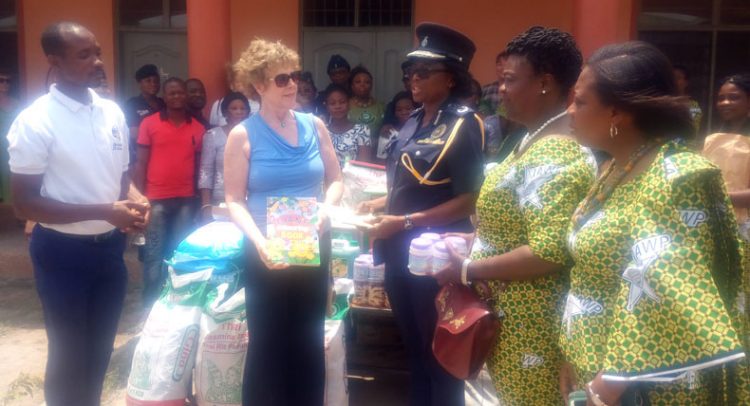COP Vib Sanziri presenting the items to Benjamin Egyir
The Board of Directors of the International Association of Women Police (IAWP), Police Ladies Association (POLAS), Immigration Ladies and the Judicial Ladies Association over the weekend visited the Don Bosco Shelter for Trafficked Children at Tema in the Greater Accra Region to interact with the children.
The visit was to learn at firsthand the living conditions of the children and find ways to support them.
Some food items, toiletries, detergents, among others, and an undisclosed amount of money were also donated to the orphanage.
The Board of Directors of IAWP, which comprises the Ghana Police Ladies Association, Immigration Ladies Association and the Judicial Service Ladies Association, were in the country a week ago to hold their first meeting in Africa after its establishment 120 years ago.
Addressing the Children, Margaret Shorter, Global President of the (IAWP), said since they work in agencies that enforce the law to protect mothers and grandmothers, there was the need to reach out to the children and help them overcome their trauma.
“The children need help and the only way to help them is to fight to put an end to child trafficking entirely.
“We are here to see the children, who are also like our own children and grand children, help them overcome their trauma and find a way of stopping child trafficking across the world.”
The President of the Police Ladies Association, COP Beatrice Vib Sanziri, who doubles as the Director General in-charge of Human Resource, said “We are presenting 10 bags of rice, three gallons of oil, tin tomatoes, detergents, five cartons of tooth paste and brushes, toiletries and assorted cosmetics and an undisclosed amount of money for the upkeep of the children.”
Benjamin Egyir, a social worker at the Don Bosco Shelter for Trafficked and Saved Children, told the IAWP members that the centre was under the management of the Salesians of Don Bosco, a Catholic Religious Institute.
He said between 2011 and 2012, the Salesians had an idea to operate an orphanage to help poor children but government at the time had stopped the registration of orphanages in the country.
The Salesians put up the structures for the orphanage in consultation with ACP Patience Quaye, the former Director of Anti Human Trafficking Unit to support the rescued children of child trafficking.
In 2014, the first batch of 14 rescued children was received at the centre.
Currently, he said the centre has 47 rescued children, 41 of them are receiving formal education at the home, while seven others attend a community school outside the centre.
“Our aim is to provide temporary shelter and rehabilitation for the rescued victims between the ages of 7 and 17 in order to help combat child exploitation.”
He said when the children first report, they are screened properly at the Police Hospital after which a psychologist assesses them.
“We keep the children for a period of nine months and during this period each child gets the opportunity to meet a social worker for counseling and when they fully recover, we reunite them with their families.”
There are instances whereby the centre, in collaboration with the police, fails to reunite them with their families, but the children are taken care during the search.
By Linda Tenyah-Ayettey

